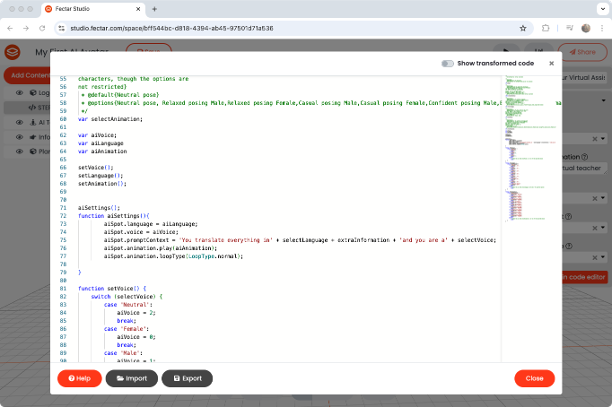In this post, we delve into how we handle system integration through the Fectar Spatial Engine. Our platform is designed to connect various systems using API calls, enabling seamless data flow and integration. One of our standout features is our ability to work with IoT solutions, especially through our MQTT implementation, which allows real-time data processing and visualization in XR environments.
Simplifying Integration for System Integrators
As a system integrator, you’re familiar with the complexities that come with building scalable and flexible infrastructures. With this in mind, we’ve designed a modular system that simplifies the integration of IoT communication within your projects. This system offers full control and flexibility through our Content Management System (CMS), which is already equipped to manage AR and VR scenes. The CMS can be integrated with your project’s newly developed modules, supporting HTTP and REST API calls, making our system compatible with a wide range of web services and applications.
Modular Design for Enhanced Flexibility
Our solution is built from independent modules, each tailored to specific functionalities such as IoT communication. These modules can be seamlessly integrated into your existing architecture, allowing for easy scaling or customization based on the project’s needs. Whether you require additional features or need to scale up, our modules can be updated or replaced without disrupting the overall infrastructure.
CMS-Controlled Modules for Centralized Management
A key feature of our system is the centralized control offered through the CMS. This enables you to manage, configure, and monitor all system modules from one place. This centralization reduces complexity, enhances control, and makes it easier to handle large-scale deployments while adapting to evolving requirements.
IoT-Ready Communication
Understanding the critical role of IoT in modern infrastructures, our modules are fully equipped to support IoT communication protocols. Our current supported protocols include:
- MQTT (Message Queuing Telemetry Transport): Ideal for low-bandwidth, high-efficiency IoT communications, MQTT ensures fast and secure data transmission between devices and the cloud.
- HTTP (RESTful APIs): We support HTTP calls, including REST APIs, making our system compatible with a broad range of web services and applications.
Future-Proof with Extensibility
Although MQTT and HTTP are our current standards, the Fectar system is designed to be future-proof. As new protocols and technologies emerge, our architecture allows for easy integration of additional communication protocols, ensuring that your system evolves alongside industry developments.
Multiple Hosting Solutions
The Fectar API is implemented using the .Net framework and a SQL database, currently hosted on Microsoft Azure. However, the system can also be deployed in other environments, such as:
- A virtual or physical machine running Microsoft Windows.
- A Kubernetes cluster or set of Docker images.
With minimal modification, our application can run on these platforms, providing flexibility in how you host and manage the system.
Key Benefits for System Integrators
- Scalability: Our modular design makes it easy to scale as your project grows, without requiring a complete system overhaul.
- Centralized Control: Managing all modules through a unified CMS ensures better control, efficiency, and responsiveness.
- IoT Standards Compatibility: By supporting both MQTT and REST APIs, our system is ready for a wide variety of IoT and web applications.
- Customizability: Modules can be easily modified or replaced, allowing for flexible customization based on your project’s specific needs.
